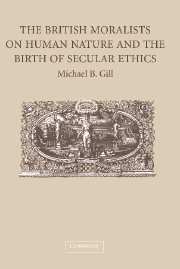Book contents
- Frontmatter
- Contents
- Introduction
- PART ONE WHICHCOTE AND CUDWORTH
- PART TWO SHAFTESBURY
- PART THREE HUTCHESON
- 10 Early Influences on Francis Hutcheson
- 11 Hutcheson's Attack on Egoism
- 12 Hutcheson's Attack on Moral Rationalism
- 13 A Copernican Positive Answer and an Attenuated Moral Realism
- 14 Explaining Away Vice, or Hutcheson's Defense of a Copernican, Theistic Positive Answer
- PART FOUR DAVID HUME
- Notes
- Bibliography
- Index
10 - Early Influences on Francis Hutcheson
Published online by Cambridge University Press: 29 July 2009
- Frontmatter
- Contents
- Introduction
- PART ONE WHICHCOTE AND CUDWORTH
- PART TWO SHAFTESBURY
- PART THREE HUTCHESON
- 10 Early Influences on Francis Hutcheson
- 11 Hutcheson's Attack on Egoism
- 12 Hutcheson's Attack on Moral Rationalism
- 13 A Copernican Positive Answer and an Attenuated Moral Realism
- 14 Explaining Away Vice, or Hutcheson's Defense of a Copernican, Theistic Positive Answer
- PART FOUR DAVID HUME
- Notes
- Bibliography
- Index
Summary
The Scottish philosopher Francis Hutcheson lived almost a century after Whichcote and Cudworth. But his early intellectual trajectory paralleled the Cambridge Platonists' in fascinating ways. Hutcheson, like Whichcote and Cudworth, was born into a household dominated by a Calvinist Negative Answer to the Human Nature Question. And Hutcheson, again like Whichcote and Cudworth, found his way, in his early college years, to a clear and shining version of the Positive Answer, which then served as the spark to his greatest philosophical achievements.
In Section A of this chapter, I outline Hutcheson's religious upbringing. In B, I describe the role one of his college professors had in leading Hutcheson to a new view of religion, morality, and human nature. And in C, I sketch the intellectual milieu of Dublin in the 1720s, which is where Hutcheson wrote the philosophical works we will examine in more detail in the following four chapters.
The Negative Answer of the Scottish Presbyterians
Hutcheson was born in 1694 in Armagh, in the north of Ireland. His family was Scottish, and he grew up in the Scotch-Irish community. Hutcheson's grandfather was a Presbyterian minister who “came from Scotland to attend to the spiritual wants of the Scottish colony in Ireland” (Scott 1900, 4). Hutcheson's father was also a minister, and he too served the Scots in Ireland.
The Scottish Presbyterianism Hutcheson's father and grandfather preached bears a striking resemblance to the English Calvinism of the early 1600s.
- Type
- Chapter
- Information
- Publisher: Cambridge University PressPrint publication year: 2006



